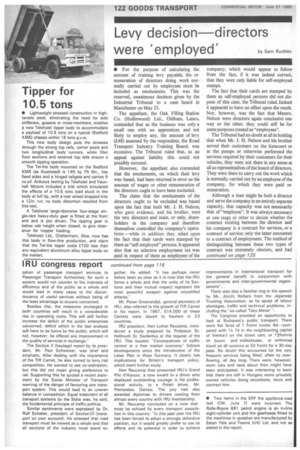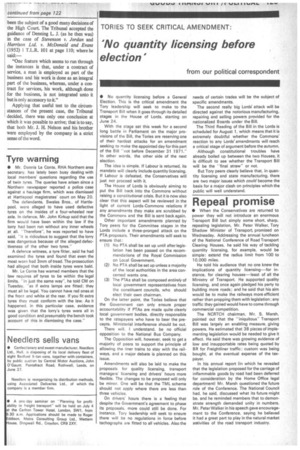Levy decision directors
Page 124

Page 127

If you've noticed an error in this article please click here to report it so we can fix it.
were 'employed' by Sam Buckley
• For the purpose of calculating the amount of training levy payable, the remuneration of directors doing work normally carried out by employees must be included as emoluments. This was the reserved, unanimous decision given by the Industrial Tribunal to a case heard in Manchester on May 23.
The appellant, the Oak Filling Station Co. (Hollinwood) Ltd., Oldham, Lanes, contended that as the business was only a small one with no apprentices and not likely to employ any, the amount of levy (£48) assessed by the respondent, the Road Transport Industry Training Board, was excessive. The Tribunal ruled that, as an appeal against liability this could not possibly succeed.
However, the appellant also contended that the emoluments, on which their levy was based, had been returned in error as the amount of wages or other remuneration of the directors ought to have been excluded.
The claim that the emoluments of the directors ought to be excluded was based upon the fact that both Mr. J. H. Nelson, who gave evidence, and his brother, were the two directors and main, or only, shareholders in the company and therefore themselves controlled the company's operations—while in addition they relied upon the fact that their cards were stamped by them as "self-employed" persons. It appeared also that no selective employment tax was paid in respect of them as employees of the
company; which would appear to follow from the fact, if it was indeed correct, that they were only liable for self-employed stamps.
The fact that their cards are stamped by them as self-employed persons did not dispose of this case, the Tribunal ruled. Indeed it appeared to have no effect upon the result Nor, however, was the fact that Messrs. Nelson were directors again conclusive one way or the other; they could still be for some purposes treated as "employees".
The Tribunal had no doubt at all in holding that when Mr. J. H. Nelson and his brother served their customers on the forecourt or at the pumps or otherwise performed the services required by their customers for their vehicles, they were not there in any sense at all as representatives of the board of directors. They were there to carry out the work which is normally carried out by an employee of the company, for which they were paid remuneration.
Although a man might be both a director and serve the company in an entirely separate capacity, that capacity was not necessarily that of "employee". It was always necessary at one stage or other to decide whether the contract existing between the director and his company is a contract for services, or a contract of service; only the latter amounted to a contract of employment. The method of distinguishing between these two types of contract was extremely obscure, and had
been the subject of a good many decisions of the High Court. The Tribunal accepted the guidance of Denning L. J. (as he then was) in the case of Stevenson v. Jordan and Harrison Ltd. v. McDonald and Evans (1952) 1 T.L.R. 101 at page 110; where he said:— "One feature which seems to run through the instances is that, under a contract of service, a man is employed as part of the business and his work is done as an integral part of the business, whereas, under a contract for services, his work, although done for the business, is not integrated unto it but is only accessory to it."
Applying that useful test to the circumstances of the present case, the Tribunal decided, there was only one conclusion at which it was possible to arrive; that is to say, that both Mr. J. H. Nelson and his brother were employed by the company in a strict sense of the word.








































































































































































































